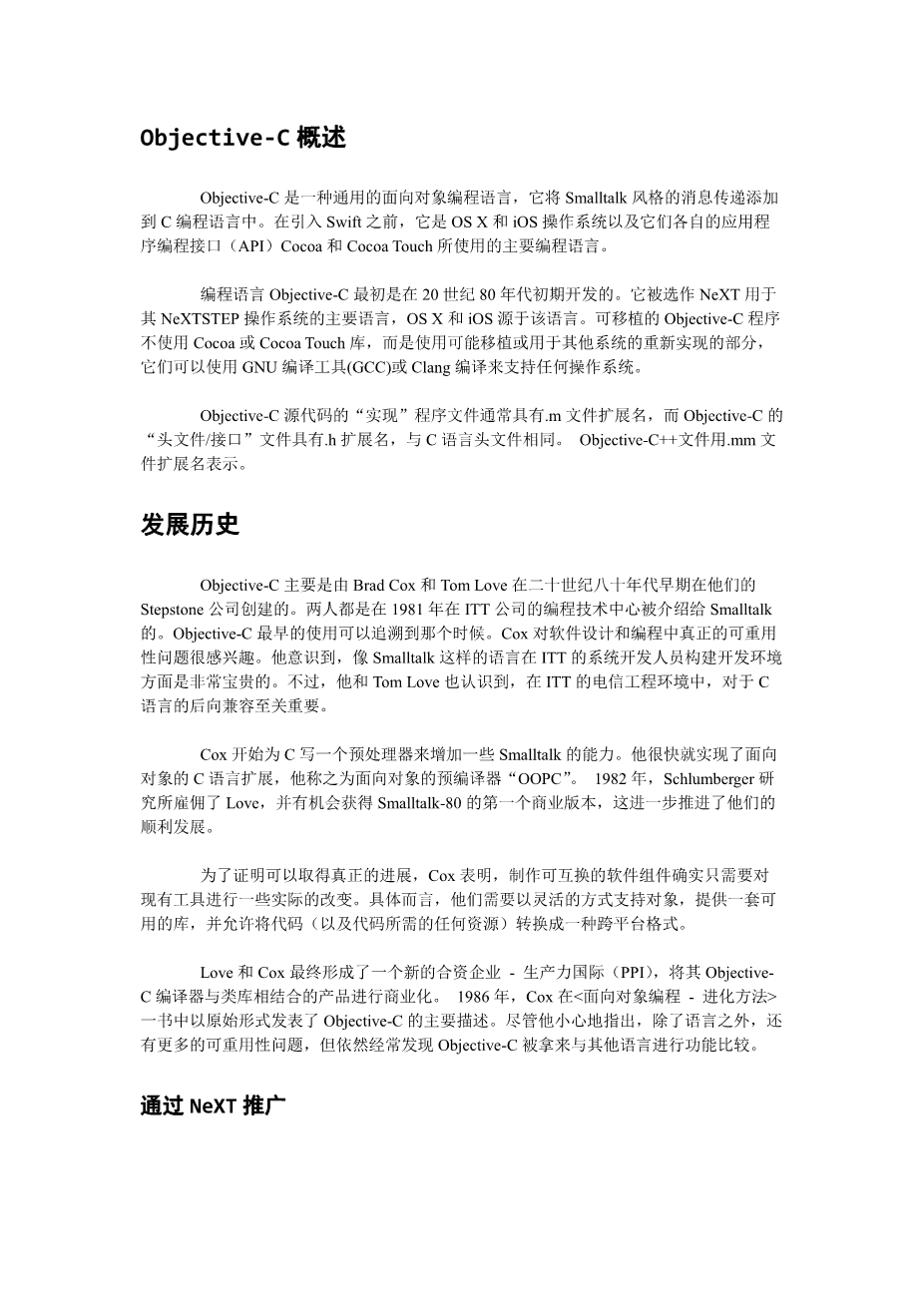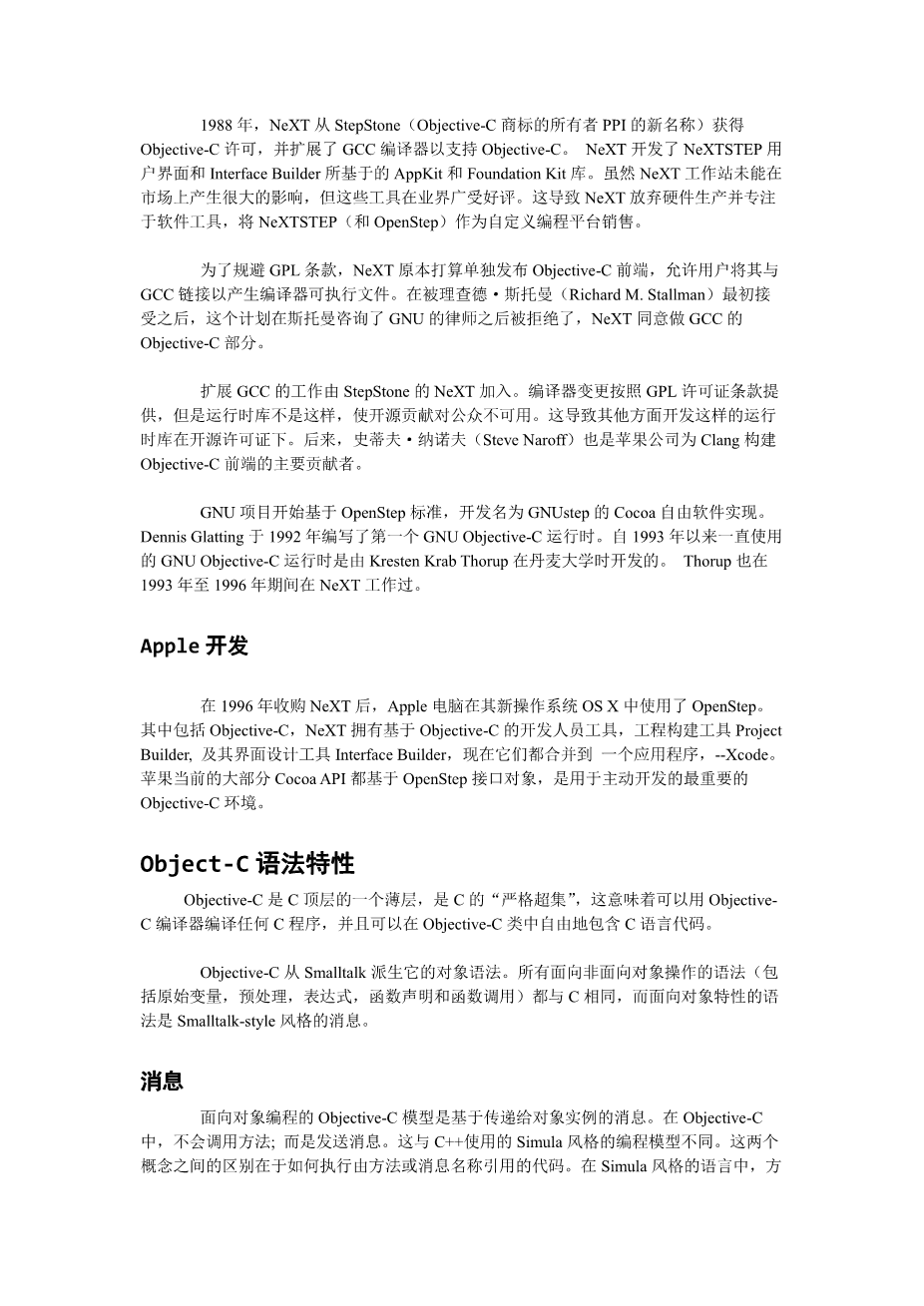Objective-c
Objective-C is a general-purpose, object-oriented programming language that adds Smalltalk-style messaging to the C programming language. It was the main programming language used by Apple for the OS X and iOS operating systems, and their respective application programming interfaces (APIs) Cocoa and Cocoa Touch prior to the introduction of Swift.
The programming language Objective-C was originally developed in the early 1980s. It was selected as the main language used by NeXT for its NeXTSTEP operating system, from which OS X and iOS are derived. Portable Objective-C programs that do not use the Cocoa or Cocoa Touch libraries, or those using parts that may be ported or reimplemented for other systems, can also be compiled for any system supported by GNU Compiler Collection (GCC) or Clang.
Objective-C source code #39;implementation#39; program files usually have .m filename extensions, while Objective-C #39;header/interface#39; files have .h extensions, the same as C header files. Objective-C files are denoted with a .mm file extension.
History
Objective-C was created primarily by Brad Cox and Tom Love in the early 1980s at their company Stepstone. Both had been introduced to Smalltalk while at ITT Corporation#39;s Programming Technology Center in 1981. The earliest work on Objective-C traces back to around that time. Cox was intrigued by problems of true reusability in software design and programming. He realized that a language like Smalltalk would be invaluable in building development environments for system developers at ITT. However, he and Tom Love also recognized that backward compatibility with C was critically important in ITT#39;s telecom engineering milieu.
Cox began writing a pre-processor for C to add some of the abilities of Smalltalk. He soon had a working implementation of an object-oriented extension to the C language, which he called 'OOPC' for Object-Oriented Pre-Compiler. Love was hired by Schlumberger Research in 1982 and had the opportunity to acquire the first commercial copy of Smalltalk-80, which further influenced the development of their brainchild.
In order to demonstrate that real progress could be made, Cox showed that making interchangeable software components really needed only a few practical changes to existing tools. Specifically, they needed to support objects in a flexible manner, come supplied with a usable set of libraries, and allow for the code (and any resources needed by the code) to be bundled into one cross-platform format.
Love and Cox eventually formed a new venture, Productivity Products International (PPI), to commercialize their product, which coupled an Objective-C compiler with class libraries. In 1986, Cox published the main description of Objective-C in its original form in the book Object-Oriented Programming, An Evolutionary Approach. Although he was careful to point out that there is more to the problem of reusability than just the language, Objective-C often found itself compared feature for feature with other languages.
Popularization through NeXT
In 1988, NeXT licensed Objective-C from StepStone (the new name of PPI, the owner of the Objective-C trademark) and extended the GCC compiler to support Objective-C. NeXT developed the AppKit and Foundation Kit libraries on which the NeXTSTEP user interface and Interface Builder were based. While the NeXT workstations failed to make a great impact in the marketplace, the tools were widely lauded in the industry. This led NeXT to drop hardware production and focus on software tools, selling NeXTSTEP (and OpenStep) as a platform for custom programming.
In order to circumvent the terms of the GPL, NeXT had originally intended to ship the Objective-C frontend separately, allowing the user to link it with GCC to produce the compiler executable. After being initially accepted by Richard M. Stallman, this plan was rejected after Stallman consulted with GNU#39;s lawyers and NeXT agreed to make Objective-C part of GCC.
The work to extend GCC was led by Steve Naroff, who joined NeXT from StepStone. The compiler changes were made available as per GPL license terms, but the runtime libraries were not, rendering the open source contribution unusable to the general public. This led to other parties developing such runtime libraries under open source license. Later, Steve Naroff was also principal contributor to work at Apple to build the Objective-C frontend to Clang.
The GNU project started work on its free software implementation of Cocoa, named GNUstep, based on the OpenStep standard. Dennis Glatting wrote the first GNU Objective-C runtime in 1992. The GNU Objective-C runtime, which has been in use since 1993, is the one developed by Kresten Krab Thorup when he was a university student in Denmark. Thorup also worked at NeXT from 1993 to 1996.
Apple development
After acquiring NeXT in 1996, Apple Computer used OpenStep in its new operating system, OS X. This included Objective-C, NeXT#39;s Objective-C-based developer tool, Project Builder, and its interface design tool, Interface Builder, both now merged into one application, Xcode. Most of Apple#39;s current Cocoa API is based on OpenStep interface objects and is the most significant Objective-C environment being used for active development.
Syntax
Objective-C is a thin layer atop C, and is a 'strict superset' of C, meaning that it is possible to compile any C program with an Objective-C compiler, and to freely include C language code within an Objective-C class.
Objective-C derives its object syntax from Smalltalk. All of the syntax for non-object-oriented operations (including primitive variables, pre-processing, expressions, function declarations, and function calls) are identical to those of C, while the syntax for object-oriented features is an implement
全文共25456字,剩余内容已隐藏,支付完成后下载完整资料


英语原文共 8 页,剩余内容已隐藏,支付完成后下载完整资料
资料编号:[14226],资料为PDF文档或Word文档,PDF文档可免费转换为Word


